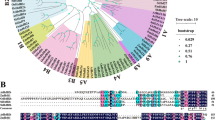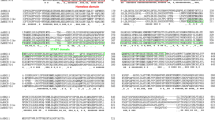Abstract
In our previous study, 25 Hsf gene homologues were identified and analyzed in maize. However, the exact functions of these gene family members are unclear at present. Here, we report the isolation and characterization of a strongly heat-induced HsfA2 gene from maize, ZmHsf04, and show its function in the heat/salt-stress response. Subcellular location assays showed that the ZmHsf04 protein is localized to the nucleus. Transcription activation data demonstrate that an AHA2 domain protein is necessary for the transcriptional activity of ZmHsf04. Furthermore, the function of ZmHsf04 was characterized in detail in transgenic plants of Arabidopsis thaliana Col-0. Overexpression of ZmHsf04 in Arabidopsis enhanced thermotolerance and positively regulated short-term-acquired thermotolerance. In addition, ZmHsf04 significantly improved salt tolerance and increased the sensitivity to abscisic acid in transgenic Arabidopsis. Overexpression of ZmHsf04 in Col-0 plants significantly up-regulated the expression of heat-specific HSP genes (AtHsp25.3-P, AtHsp18.2-CI, and AtHsp70B) and stress-related genes (AtAPX2 and AtGolS1) compared to the wild type. In summary, we have characterized a transcriptional regulator, ZmHsf04, which has important functions in enhancing heat and salt tolerance in plants.








Similar content being viewed by others
References
Baniwal SK, Bharti K, Chan KY, Fauth M, Ganguli A, Kotak S, Mishra SK, Nover L, Port M, Scharf KD (2005) Heat stress response in plants: a complex game with chaperones and more than twenty heat stress transcription factors. J Biosci 29:471–487
Blair WS, Fridell RA, Cullen BR (1996) Synergistic enhancement of both initiation and elongation by acidic transcription activation domains. EMBO J 15:1658–1665
Brej T (2014) Heavy metal tolerance in Agropyron repens (L.) P. Bauv. populations from the Legnica copper smelter area, Lower Silesia. Acta Soc Bot Pol 67:325–333
Charng Y, Liu H, Liu N (2006) Arabidopsis Hsa32, a Novel Heat Shock Protein, Is Essential for Acquired Thermotolerance during Long Recovery after Acclimation. Plant Physiol 140:1297–1305
Charng YY, Liu HC, Liu NY, Chi WT, Wang CN, Chang SH, Wang TT (2007) A heat-inducible transcription factor, HsfA2, is required for extension of acquired thermotolerance in Arabidopsis. Plant Physiol 143:251–261
Clough SJ, Bent AF (1998) Floral dip: a simplified method for agrobacterium-mediated transformation of Arabidopsis thaliana. Plant J 16:735–743
Dong Hee Lee, Lee CB (2000) Chilling stress-induced changes of antioxidant enzymes in the leaves of cucumber: in gel enzyme activity assays. Plant Sci 159:75–85
Döring P, Treuter E, Kistner C, Lyck R, Chen A, Nover L (2000) The role of AHA motifs in the activator function of tomato heat stress transcription factors HsfA1 and HsfA2. Plant Cell 12:265–278
Giorno F, Wolters-Arts M, Grillo S, Scharf KD, Vriezen WH, Mariani C (2010) Developmental and heat stress-regulated expression of HsfA2 and small heat shock proteins in tomato anthers. J Exp Bot 61:453–462
Guo L, Chen S, Liu K, Liu Y, Ni L, Zhang K, Zhang L (2008) Isolation of heat shock factor HsfA1a-binding sites in vivo revealed variations of heat shock elements in Arabidopsis thaliana. Plant Cell Physiol 49:1306–1315
He L, Ma X, Li Z, Jiao Z, Li Y, Ow DW (2016) Maize OXIDATIVE STRESS2 homologs enhance cadmium tolerance in Arabidopsis through activation of a putative SAM-dependent methyltransferase gene. Plant Physiol 171:1675–1685
Hong SW, Vierling E (2000) Mutants of Arabidopsis thaliana defective in the acquisition of tolerance to high temperature stress. Proc Natl Acad Sci USA 97:4392–4397
Jolly C, Morimoto RI (2000) Role of the heat shock response and molecular chaperones in oncogenesis and cell death. J Natl Cancer Inst 92:1564–1572
Larkindale J, Vierling E (2008) Core genome responses involved in acclimation to high temperature. Plant Physiol 146:748–761
Li C, Chen Q, Gao X, Qi B, Chen N, Xu S, Chen J, Wang X (2005) AtHsfA2 modulates expression of stress responsive genes and enhances tolerance to heat and oxidative stress in Arabidopsis. Sci China Ser C Life Sci 48:540–550
Li S, Liu J, Liu Z, Li X, Wu F, He Y (2014) Heat-induced tas1 target1 mediates thermotolerance via heat stress transcription factor a1a—directed pathways in arabidopsis. Plant Cell 26:1764–1780
Lin YX, Jiang HY, Chu ZX, Tang XL, Zhu SW, Cheng BJ (2011) Genome-wide identification, classification and analysis of heat shock transcription factor family in maize. BMC Genom 12:76–90
Liu HC, Charng YY (2013) Common and distinct functions of arabidopsis class a1 and a2 heat shock factors in diverse abiotic stress responses and development. Plant Physiol 163:276–290
Liu HC, Liao HT, Charng YY (2011) The role of class A1 heat shock factors (HSFA1s) in response to heat and other stresses in Arabidopsis. Plant Cell Environ 34:738–751
Livak KJ, Schmittgen TD (2001) Analysis of relative gene expression data using real-time quantitative PCR and the 2−ΔΔCT method. Methods 25:402–408
Meiri D, Breiman A (2009) Arabidopsis ROF1 (FKBP62) modulates thermotolerance by interacting with HSP90.1 and affecting the accumulation of HsfA2-regulated HSPs. Plant J 59:387–399
Mishra SK, Tripp J, Winkelhaus S, Tschiersch B, Theres K, Nover L, Scharf KD (2002) In the complex family of heat stress transcription factors, HsfA1 has a unique role as master regulator of thermotolerance in tomato. Gene Dev 16:1555–1567
Neta-Sharir I, Isaacson T, Lurie S, Weiss D (2005) Dual role for tomato heat shock protein 21: protecting photosystem II from oxidative stress and promoting color changes during fruit maturation. Plant Cell 17:1829–1838
Nishizawa A, Yabuta Y, Yoshida E, Maruta T, Yoshimura K, Shigeoka S (2006) Arabidopsis heat shock transcription factor A2 as a key regulator in response to several types of environmental stress. Plant J 48:535–547
Nover L, Bharti K, Doring P, Mishra SK, Ganguli A, Scharf KD (2001) Arabidopsis and the heat stress transcription factor world: how many heat stress transcription factors do we need? Cell Stress Chaperones 6:177–189
Ogawa D, Yamaguchi K, Nishiuchi T (2007) High-level overexpression of the Arabidopsis HsfA2 gene confers not only increased thermotolerance but also salt/osmotic stress tolerance and enhanced callus growth. J Exp Bot 58:3373–3383
Panchuk II, Volkov RA, SchöZ F (2002) Heat stress- and heat shock transcription factor-dependent expression and activity of ascorbate peroxidase in Arabidopsis. Plant Physiol 129:838–853
Perez-Salamo Papdi C, Rigo G, Zsigmond L, Vilela B, Lumbreras V, Nagy I, Horvath B, Domoki M, Darula Z, Medzihradszky K, Bogre L, Koncz C, Szabados L (2014) The heat shock factor A4A confers salt tolerance and is regulated by oxidative stress and the mitogen-activated protein kinases MPK3 and MPK6. Plant Physiol 165:319–334
Prieto-Dapena P, Castaño R, Almoguera C, Jordano J (2008) The ectopic overexpression of a seed-specific transcription factor, HaHSFA9, confers tolerance to severe dehydration in vegetative organs. Plant J 54:1004–1014
Sanmiya K, Suzuki K, Egawa Y, Shono M (2004) Mitochondrial small heat-shock protein enhances thermotolerance in tobacco plants. FEBS Lett 557:265–268
Sato H, Todaka D, Kudo M (2016) The Arabidopsis transcriptional regulator DPB3-1 enhances heat stress tolerance without growth retardation in rice. Plant Biotechnol J 14:1756–1767
Scharf KD, Rose S, Zott W, Schöffl F, Nover L, Schöff F (1990) Three tomato genes code for heat stress transcription factors with a region of remarkable homology to the DNA-binding domain of the yeast HSF. EMBO J 9:4495
Scharf KD, Berberich T, Ebersberger I, Nover L (2012) The plant heat stress transcription factor (Hsf) family: structure, function and evolution. Biochem Biophys Acta 1819:104–119
Schöffl F, Prändl R, Reindl A (1998) Regulation of the heat-shock response. Plant Physiol 117:1135–1141
Schramm F, Larkindale J, Kiehlmann E, Ganguli A, Englich G, Vierling E, von Koskull-Döring P (2008) A cascade of transcription factor DREB2A and heat stress transcription factor HsfA3 regulates the heat stress response of Arabidopsis. Plant J 53:264–274
Shi H, Tan DX, Reiter RJ (2015) Melatonin induces class A1 heat-shock factors (HSFA1s) and their possible involvement of thermotolerance in Arabidopsis. J Pineal Res 58:335–342
Shim D, Hwang JU, Lee J, Lee S, Choi Y, An G, Lee Y (2009) Orthologs of the class A4 heat shock transcription factor HsfA4a confer cadmium tolerance in wheat and rice. Plant Cell 21:4031–4043
Von Koskull-Döring P, Scharf KD, Nover L (2007) The diversity of plant heat stress transcription factors. Trends Plant Sci 12:452–457
Wan XL, Yang J, Li XB, Zhou Q, Guo C, Bao MZ, Zhang JW (2016) Over-expression of PmHSP17.9 in transgenic arabidopsis thaliana confers thermotolerance. Plant Mol Biol Rep 34:899–908
Wang T, Sui Z, Liu X, Li Y, Li H, Xing J, Ni Z (2016a) Ectopic expression of a maize hybrid up-regulated gene, ErbB-3 binding Protein 1 (ZmEBP1), increases organ size by promoting cell proliferation in Arabidopsis. Plant Sci 243:23–34
Wang X, Wang H, Liu S (2016b) Genetic variation in ZmVPP1 contributes to drought tolerance in maize seedlings. Nat Genet 48:1233–1241
Wu JD, Zhou W, Gong XF, Cheng BJ (2016) Expression of ZmHDZ4, a maize homeodomain-leucine zipper I gene, confers tolerance to drought stress in transgenic rice. Plant Mol Biol Rep 34:845–853
Xue GP, Sadat S, Drenth J, McIntyre CL (2014) The heat shock factor family from Triticum aestivum in response to heat and other major abiotic stresses and their role in regulation of heat shock protein genes. J Exp Bot 65:539–557
Xue GP, Drenth J, McIntyre CL (2015) TaHsfA6f is a transcriptional activator that regulates a suite of heat stress protection genes in wheat (Triticum aestivum L.) including previously unknown Hsf targets. J Exp Bot 66:1025–1039
Yamaguchi-Shinozaki K, Shinozaki K (2005) Organization of cis-acting regulatory elements in osmotic- and cold-stress-responsive promoters. Trends Plant Sci 10:88–94
Yokotani N, Ichikawa T, Kondou Y, Matsui M, Hirochika HM, Oda K (2008) Expression of rice heat stress transcription factor oshsfa2e enhances tolerance to environmental stresses in transgenic Arabidopsis. Planta 227:957–967
Yoshida T, Sakuma Y, Todaka D, Maruyama K, Qin F (2008) Functional analysis of an Arabidopsis heat-shock transcription factor HsfA3 in the transcriptional cascade downstream of the DREB2A stress-regulatory system. Biochem Biophys Res Commun 368:515–521
Zhang S, Xu ZS, Li P, Yang L, Wei Y, Chen M, Li L, Zhang G, Ma Y (2012) Overexpression of TaHSF3 in transgenic arabidopsis enhances tolerance to extreme temperatures. Plant Mol Biol Rep 31:688–697
Acknowledgements
This work was supported by National Natural Science Foundation of China (31501321 and 31301324), the Anhui University Natural Science Research Projects (KJ2015A100), the SRF of AHAU (2017) and Natural Science Foundation of Anhui Province for Outstanding Young Talents (gxyqZD2017018).
Author information
Authors and Affiliations
Corresponding author
Additional information
Communicated by H. Peng.
Rights and permissions
About this article
Cite this article
Jiang, Y., Zheng, Q., Chen, L. et al. Ectopic overexpression of maize heat shock transcription factor gene ZmHsf04 confers increased thermo and salt-stress tolerance in transgenic Arabidopsis. Acta Physiol Plant 40, 9 (2018). https://doi.org/10.1007/s11738-017-2587-2
Received:
Revised:
Accepted:
Published:
DOI: https://doi.org/10.1007/s11738-017-2587-2




